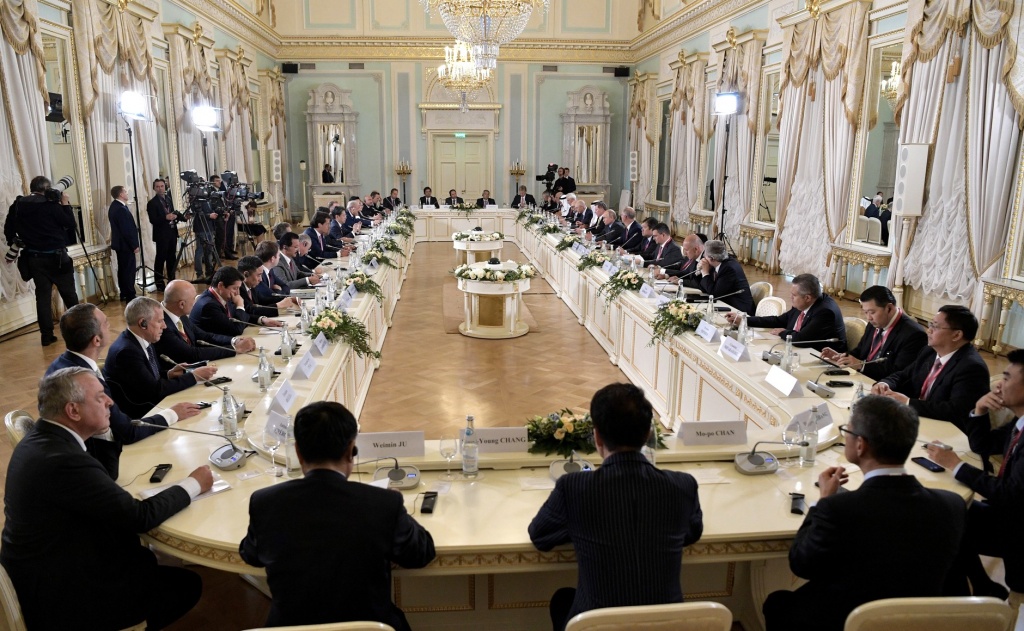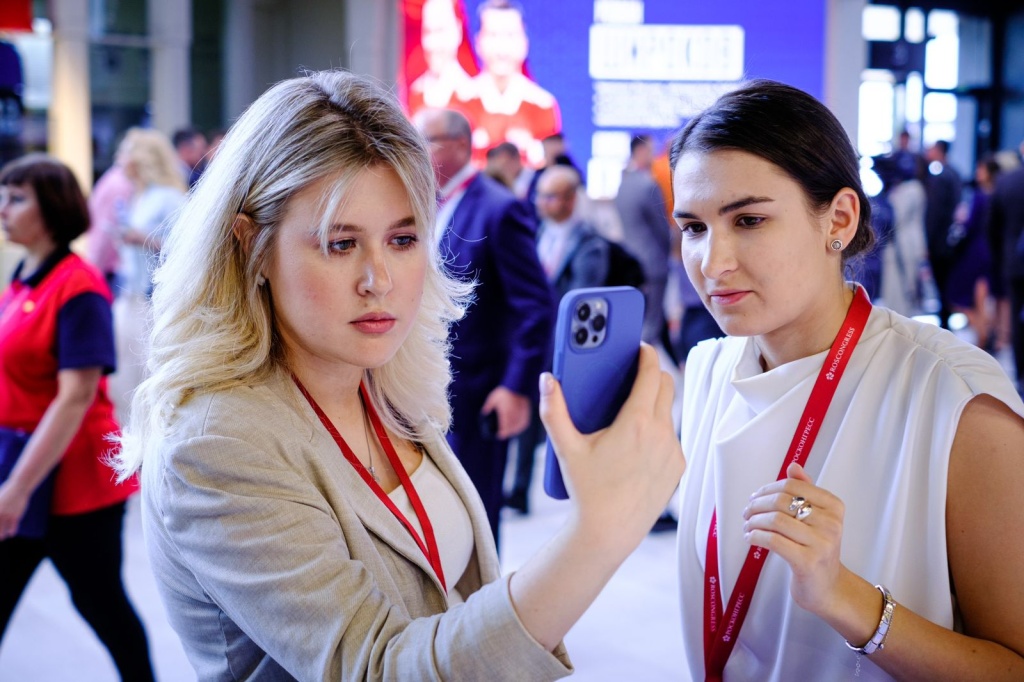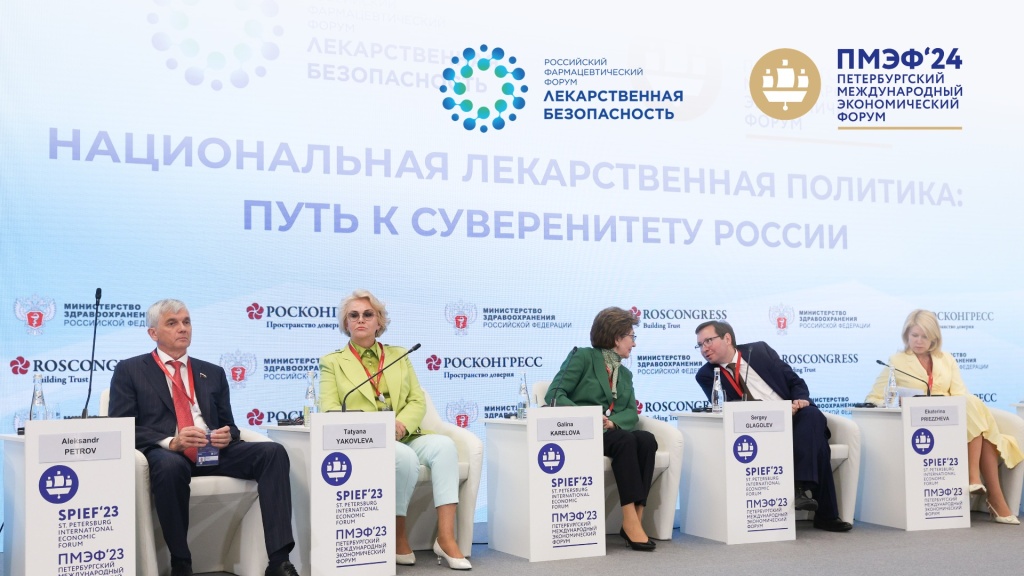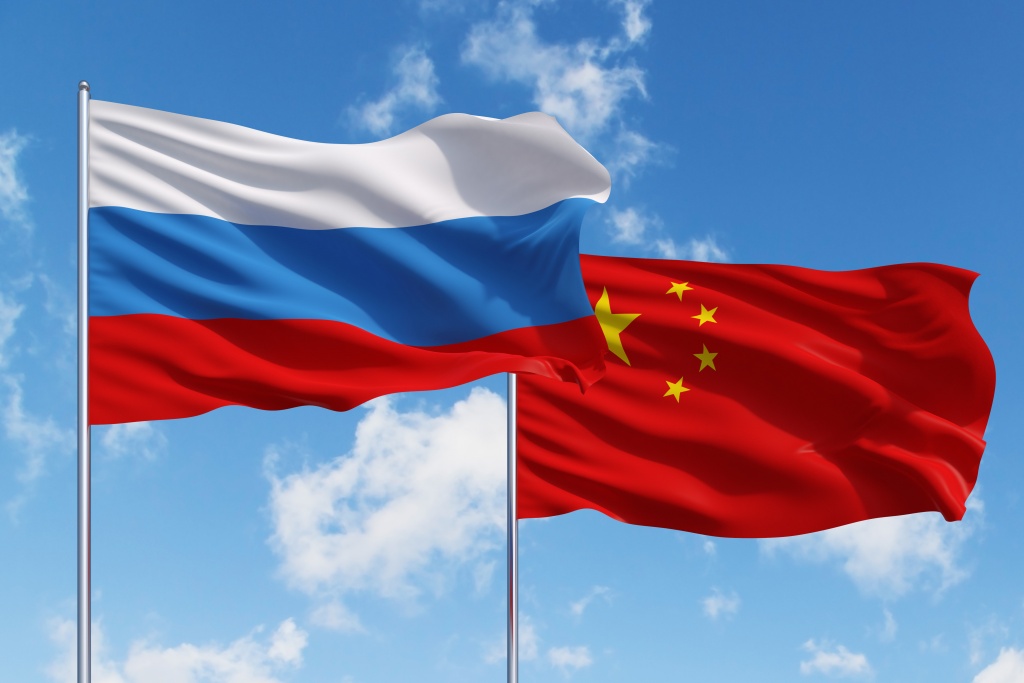
Meeting with RDIF International Advisory Board and international investment community leaders
Vladimir Putin met with members of the Russian Direct Investment Fund (RDIF) International Advisory Board and representatives of the international investment community. The meeting was held in a working lunch format.
This year the meeting was attended by representatives from investment funds from Germany, France, Japan, China, South Korea, India, Italy, the UAE and Saudi Arabia. A total of more than 40 international investors were invited to a conversation with the Russian leader, who, generally speaking, manage over $15 trillion.
* * *
President of Russia Vladimir Putin: Colleagues, ladies and gentlemen,
Let me sincerely welcome you to our traditional meeting that is held annually within the framework of the St Petersburg International Economic Forum.
There are a great number of people here whom we have known for quite a long time, people we meet with and regularly discuss plans with. Some of our colleagues have probably come here for the first time.
I would like to express the hope that you will like it here – in Russia, in St Petersburg at the economic forum – and that these meetings will be useful and substantive and will create conditions for developing your business in Russia.
You know that we have set ourselves fairly large and ambitious development goals that are expressed in national programmes.
Basically, these are our plans and they do not come from thin air but are backed by resources, and what I consider no less important, by our real economic policy.
I would like to express the modest hope that you will agree with me that this policy produces results and creates the conditions for your active and efficient operations.
I am referring to the macroeconomic indicators that we have achieved recently – a budget surplus, the current account surplus of payment transactions and a considerable amount of international reserves.
As for inflation, let me recall that last year it was a very good figure for the Russian economy – 4.3 percent (the Minister of Economic Development agrees, so I am not mistaken). It increased a little at the beginning of this year, but now we are expecting a lower rate.
According to Rosstat, from May 28, 2019 to June 3, 2019 the inflation was only 0.01 percent, or 2.4 percent since the start of the year and 5.08 percent in annual terms. As I said, I think there is a downward trend, all the more so since low growth is predictable and we have considered this. We thought this would happen because of the VAT increase.
We thought a lot about what we should do regarding the search for sources to fund the state’s liabilities in our national programmes that I spoke about. These are large-scale projects in infrastructure development, cutting-edge manufacturing, digitalisation, healthcare and education development, and other key areas that will ensure, and must ensure high growth rates and structural changes in the economy throughout the world.
So we took it upon ourselves to increase VAT by 2 percent. We were aware that it would affect, to a certain extent, economic growth and inflation, yet we proceeded from the assumption that as the projects started unfolding, as the state invested in infrastructure and other areas which are directly dependent on the state, including those areas that create conditions for your investments, that inflation would settle down, and growth rates would go up.
This is what is happening so far. We are seeing exactly what we expected; we have not found mistakes in our forecasts yet. The 2019 January through May federal budget surplus reached 683 billion rubles. As of April 1, 2019, the trade surplus, according to the Bank of Russia, was $45.5 billion, whereas international reserves reached almost $500 billion – 492.2 billion; I have the exact figures.
Economic growth last year was 2.3 percent, the highest since 2012. I can say without exaggeration that we have overcome the hardships and have embarked on a road of sustainable development and increased growth rates.
We did not simply set the goal of becoming one of the top five economies in the world – there was a fluctuation between fifth and sixth places, there was a time when we came in fifth, but this is not the only goal.
The goal is to ensure the technological and spatial development of the country through sustainable growth, and to progress to a higher standard of living for our citizens in key parameters.
This is why the national projects and programmes I spoke about are being launched. Total funding over six years should be around $400 billion, which includes not only state funds but also private investment.
Colleagues, we would definitely welcome foreign capital in these massive plans, we offer good, reliable conditions and modern tools for cooperation. That conditions in Russia are changing has been reported by independent analysts. Specifically – I have already given these numbers today, they are well known – according to the World Bank’s Doing Business rankings, Russia has climbed from 121 to 31 in just two or three years.
This is clear progress, but we understand that it is still not enough; we will keep working on it. For this to be evident we have adopted a programme to improve the business environment and to support business and attract investment.
We have a number of instruments, and one of them is the Russian Direct Investment Fund. It was set up back in 2011, and since that time, we have used it to invest over a trillion and a half rubles in ongoing projects in almost every Russian region.
I would like to draw you attention to the fact that investment yields are higher than world indices. Is this information open or classified?
CEO of the Russian Direct Investment Fund Kirill Dmitriev: About 15 percent.
Vladimir Putin: Yes, I just was not sure if I could say it or not. This is about a 15 percent annual return on all projects with the RDIF participation.
A number of companies and investment funds together with the RDIF have already invested in the development of medical centres, the reconstruction of major highways, and so on.
I should stress that these projects have been carefully evaluated, and the main beneficiaries are the state, society and the investors. I have already told you about the return on investment.
We are ready to further expand interaction in areas like education, healthcare, transport, infrastructure, creating a modern urban environment, increasing corporate efficiency and labour productivity.
It requires both large investment and the considerable experience of launching large-scale development programmes that you possess.
Another promising area I mentioned is investing in the design and introduction of digital and other so called end-to-end technologies in promoting advanced and unique products. We see a lot of room for cooperation here, all the more so now that the high-tech markets are growing so rapidly, exponentially, as they say.
I would like to note one of the RDIF digital economy projects – establishing in cooperation with Moscow State University an AI Centre that will have competitive, comfortable conditions for scientists, engineers and programmers.
It is designed to become a crucial element in the implementation of the National Strategy for technology development in the field of artificial intelligence. I know that our Chinese friends are also showing interest in this.
This is what I wanted to say at the beginning.
There is something I would like to ask – please be understanding of the fact that, unfortunately, I do not have much time today, and my colleagues are waiting for me to take part in various events, so could we maybe change the format a little?
Usually I immediately responded to each of your comments and proposals. Maybe this time our colleagues here will say what they have to say, and then I will just try to summarise in one comment the matters that are of the biggest interest.
Thank you for your understanding.
Kirill Dmitriev: Mr President, colleagues,
On behalf of all those present I would like to thank you for your support of the Russian Direct Investment Fund and our partners present here. Very briefly, we wanted to say that interest in such meetings is growing from year to year. The investors present here manage capital of $15 trillion, which is $1.5 trillion more than last year.
Many of our partners are interested in investing in Russian national projects, and, accordingly, we will discuss in which projects or exactly how they would like to participate.
The RDIF is successfully developing, and our companies’ profits have increased by 18 percent over the past year. Many investors seem to like the RDIF model very much, because the government does not just spend money, but invests it with profitability, so that for every ruble we attract nine rubles from our partners. Moreover, we attract not only funds, but also expertise and help our companies to enter foreign markets. At present, seven other countries are creating their own funds that use the Russian Direct Investment Fund model.
Let me briefly outline our work with China. As you may know, the Russian-Chinese investment fund has invested in more than 30 projects. We are working with yuan funds in China and are creating a $10 billion fund with China Development Bank, also in yuan.
Technology cooperation with China is especially important. I am referring to our deal with Alibaba, Mail.ru and Megafon, which is being finalised, the creation of a Russian-Chinese innovation fund with a target size of $1 billion and the first venture investment by the Russian-Chinese venture capital fund.
In conclusion, I would like to say that investors are extremely interested in financing national projects in Russia. At this forum, we will announce 10 new investments of the Russian Direct Investment Fund: investment in NefteTransServis; a cattle breeding project with Inalko; joint investment with Baring Vostok in the development of ivi – a huge online cinema; partnership with DP World [major global port operator]; with Rosatom and Norilsk Nickel in the development of the Northern Sea Route and the modernisation of the Baikonur space centre – its Site 1 nicknamed Gagarinskiy Start [Gagarin's launch pad]. Investors have confirmed interest in these and many other projects.
Today we will hear about their experience, expertise and the projects in which they would like to take part.
<…>
Source http://en.kremlin.ru/events/president/news/60680








